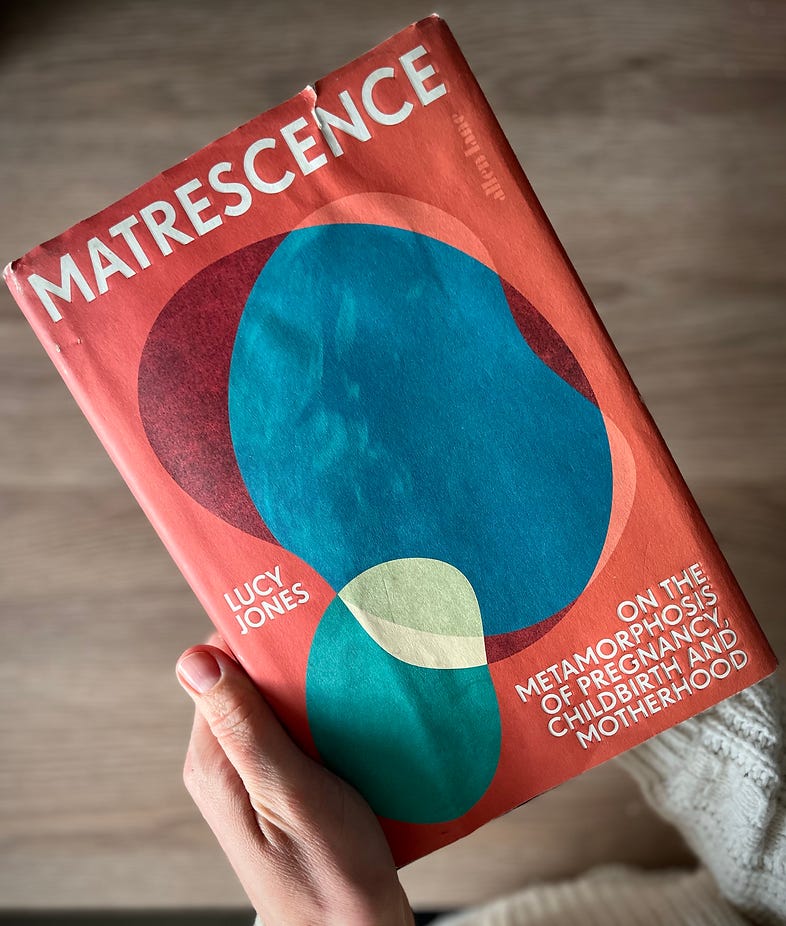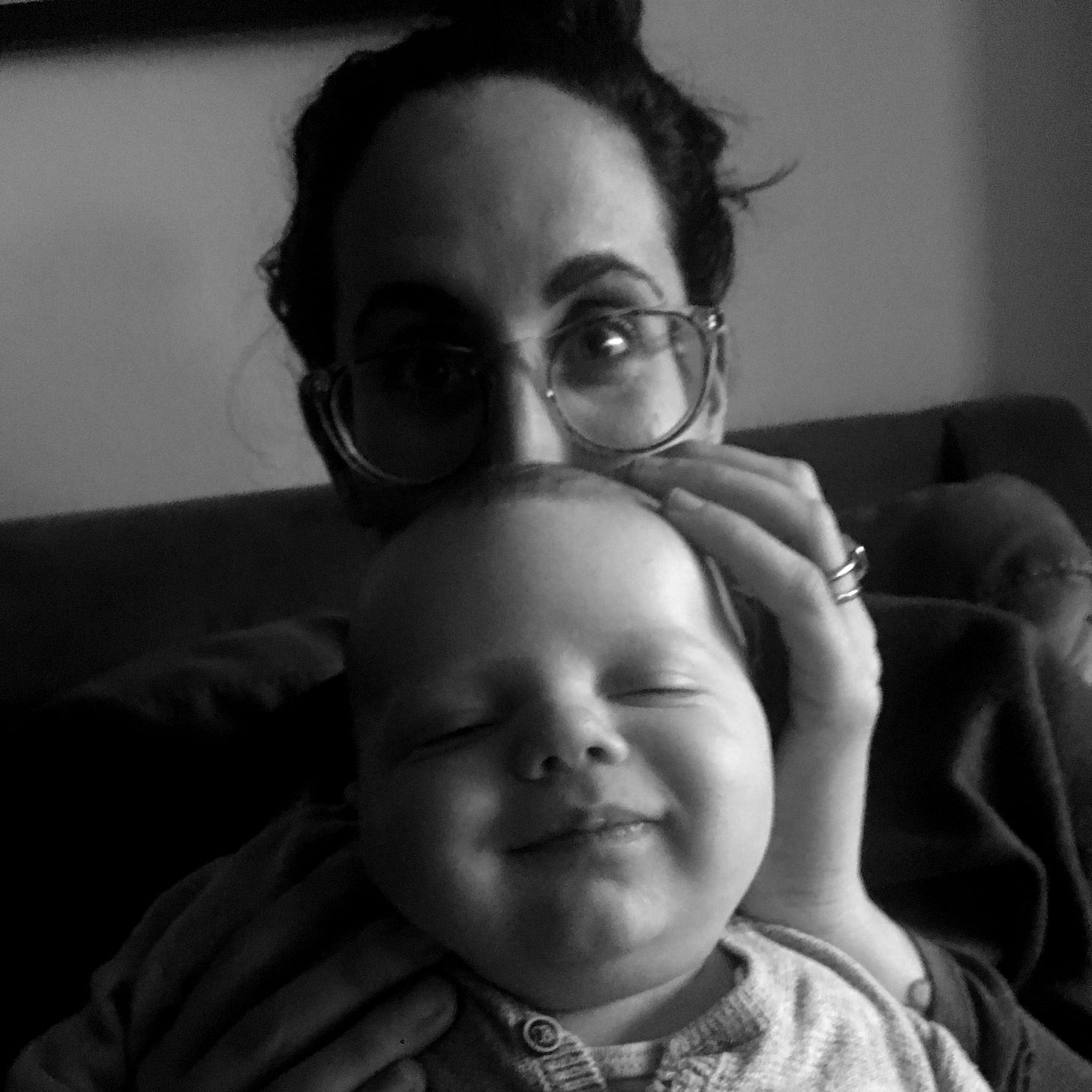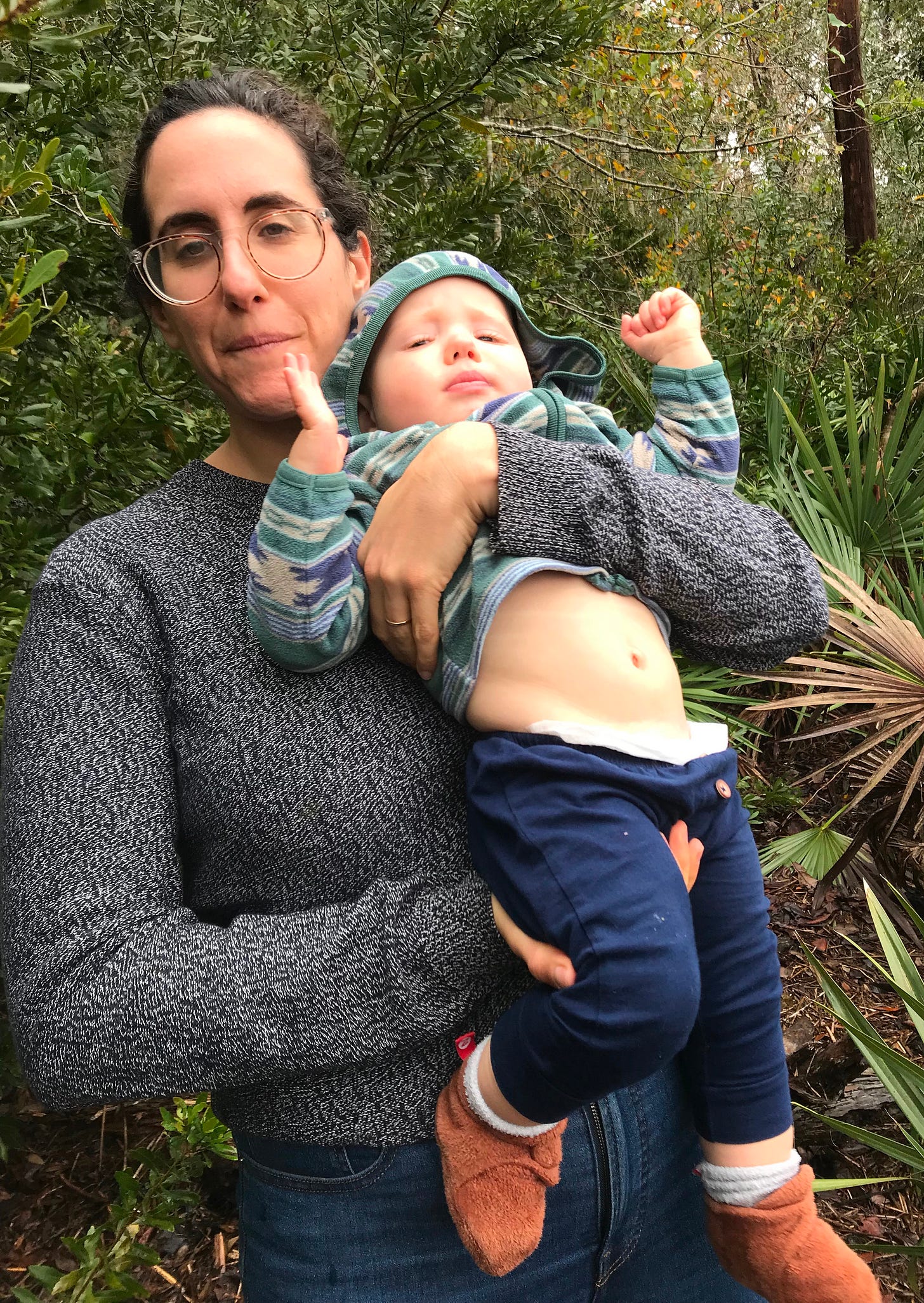Matrescence is cool and punk
The one where I convince you matrescence is important (and cool and punk)
I’ll get right to it— one of my biggest motivations for starting this newsletter was to spread the word about matrescence.
Matrescence is the process of becoming a mother—a developmental passage that spans pre-conception, pregnancy, birth, surrogacy, or adoption, and continues through the postnatal period and beyond.
Just as adolescence marks the profound shift from childhood to adulthood, matrescence is the transformative process that turns women into mothers, reshaping every aspect of life—biological, psychological, social, emotional, spiritual, and political.
Matrescence is gradual and messy.
It’s multi-faceted and non-linear.
It demands time and patience.
And, for the first three years of my motherhood journey, I had no idea this term—or the concept—even existed.
Before I learned the word, I was scattered and confused about what I was experiencing. I was so happy to be a mom and completely enamored with my son, but I also felt unsteady, unsure, and conflicted.
When I look back on those early weeks and months (years??), what stands out most is the raw anxiety—panic-googling in the dead of night, obsessively tracking his every feed and nap, hovering over him just to be sure he was still breathing—as well as the confusing ambivalence. I was head over heels and completely under his spell, but then, at times, I’d recoil, feeling suffocated, frustrated, and craving space. And then, of course, the guilt that I’d ever feel that way.
The learning curve of motherhood was steep. My years of working with kids prepared me in many practical ways, but not in all—and certainly not for the most important part. I just couldn’t fully understand what it felt like to be a mother until I became one.
Early motherhood shook me. The changes were vast and multi-faceted. Some of them arrived quickly, while others settled in gradually, reshaping me over time.
First, of course, were the changes to my body. Pregnancy and birth are wild. Like, whoa, what even was that? Then came postpartum recovery and a new shape—wider, softer—but mostly, it was the sheer, constant use of my body. Holding, rocking, soothing, cradling, shushing, kissing, being slept on, and of course, nursing. My life suddenly revolved around my boobs—a part of me I’d hardly thought about before they became my baby’s main source of nourishment. My style had to shift to keep them accessible, and I couldn’t be away from him for more than a few hours. My whole life seemed reordered around this new, strange rhythm with my new, strange body.
Naturally, that also meant my social life changed. Meeting up with friends became harder; I was on a different schedule with different needs. And I felt drawn to staying home, cocooned with my family in our soft, warm apartment—or maybe it just felt easier to stay home, hesitant to disrupt our finely-tuned routines.
My interests evolved, softening a bit. I went from falling asleep to podcasts about literal serial killers and murder, to not being able to handle anything remotely scary—no exaggeration, Stranger Things was about as intense as I could go (this was 2018, after all). And then for the first time in my life, I began to devour raunchy romance novels, comforted by their low-stakes drama and guaranteed happily-ever-afters.
Other weird things were happening too—I was clumsier and more forgetful. My hair texture changed. I was suddenly hyper-vigilant in a new way as I walked around the city. In a twist I’d never imagined, my lifelong struggle with always being too cold was replaced by constant overheating, as if I’d become a walking furnace in my own skin.
There was also this intense cultural pressure not to change.
I was supposed to “bounce back,” to stay true to who I’d been before, and not let this new part of my identity overshadow everything else—we all roll our eyes at the mom who only talks about being a mom, right?
But it was so hard! I felt physically and emotionally bound to my son, and wonderfully so—feeding him, sleeping beside him at night, spending more time with him than with any other person in my life. His magnetic pull was overwhelming.
Yet after the pull inward, there is the push away: the need to be my own person, the desperate craving for quiet alone time, the desire to connect with other relationships, to read a book, take a shower, take a walk, have an uninterrupted thought.
How could I not change when everything about my life—everything about me—was shifting so profoundly?
I was feeling all of these radical changes in my body, my mind, my social life, but I had no language to describe it. At the time, it felt like the only culturally acceptable way to be a new mom was to appear grateful and self-sacrificing, maybe toss in a wry joke about not sleeping much. There was no framework, no label I could point to and say, Wait—this! This is what I’m experiencing!
Until I discovered the term matrescence.
Learning the term ‘matrescence’ was a revelation, It helped me understand that it was completely normal for early motherhood to come with conflicting emotions—joy, gratitude, and happiness, yes, but also frustration, sadness, loneliness, overwhelm, guilt, and ambivalence.
This concept felt life-changing because it acknowledged that motherhood isn’t something one just "gets" immediately after giving birth. Instead, it’s a gradual, ongoing evolution that deserves recognition, compassion, and real support.
Matrescence is often compared to adolescence, and for good reason. Adolescence is that tumultuous bridge between childhood and adulthood—those wild, uncomfortable, exuberant teenage years. If there’s any period of my life seared into my foundational consciousness, it’s those years. I felt so deeply as a teenager. I wore my angst on my sleeve (and dyed in my hair and pierced in my lip!) Of course, becoming a mother felt similar to that explosive time. Of course, it was as wild, primal, and messy as when I was a punk little teenager. That makes perfect sense to me.
Just like adolescence, matrescence can feel awkward and uncomfortable. Both are periods of intense physical and emotional changes, and each brings foundational shifts in identity. Both phases demand a renegotiation of relationships, personal boundaries, and internal priorities. Both are accompanied by vulnerability, growth, and sometimes rebellion against the expectations of others. There’s a constant push-and-pull between the person you were and the person you’re becoming.
Matrescence is just as unruly, transformative, and raw as adolescence. It’s gritty and primal. Matrescence is punk in the same way adolescence is—because it’s a time of becoming. To thrive you must embrace the messy, primordial goo of growth and give yourself patience and grace. That is inherently counter-cultural in a society that values instant results and treats identity like a brand. It’s too radical for all that. Capturing it all in a social media post is near impossible because it’s inherently contradictory and constantly evolving. You simply can’t pin yourself down yet.
The difference is that our culture understands adolescence. We respect it as a formative, messy transformation. Coming-of-age stories, spanning from novels to music to film, show up across generations, offering us a way to process it all. When I was a teenager, I found comfort and validation in so much: My So-Called Life, Freaks and Geeks, Dead Poets Society, The Perks of Being a Wallflower, Catcher in the Rye, Ghost World—I could literally go on forever: The Sandlot, Now and Then, Kids, not to mention Blink-182, and all the other pop-punk and emo music I listened to (and I listened to a lot of pop-punk and emo music). The stories of kids navigating the complexities of life for the first time in all of their awkward muck meant so much to me. I felt uncomfortable and self-conscious, sure, but I at least had some culturally-supported context to remind me I wasn’t alone.
There are likely dozens of textbooks devoted to adolescence—we’ve studied it from every angle—yet matrescence still isn’t even in the dictionary!!:
Being a teenager is awkward and hard, but we know that is part of the journey. We talk about it, read about it, watch movies about it. There’s cultural acceptance for it.
Let’s know it for early motherhood, too.
Name It to Tame It
Learning the term helped me “name it to tame it”—a psychological concept from Dr. Daniel Siegel, author of the parenting classic The Whole-Brain Child. This concept suggests that naming or labeling difficult emotions can help us manage and regulate them. By putting experiences into words, we activate the logical part of the brain, which calms the emotional response and makes emotions feel less overwhelming. As soon as I learned the word, I was able to accept the feelings associated with it.
And I’m not the only one who felt that way upon learning the term:
Lucy Jones, author of Matrescence: On the Metamorphosis of Pregnancy, Childbirth, and Motherhood (2023), has written a truly wonderful book. Blending memoir with science-writing, the book is evocative and insightful.
She shares the moment she first encountered the word "matrescence":
“When our baby was about nine months old, I had a breakthrough. I happened upon a word I’ve never read before, in an article in The New York Times written by a reproductive psychiatrist called Alexandra Sacks. It was a word which brought together everything I was feeling, seeing and reading about.
Matrescence.
’The process of becoming a mother, which anthropologists call “matrescence,” has been largely unexplored in the American medical community, says Sacks. ‘Instead of focusing on the woman’s identity transition, more research is focused on how the baby turns out. But a woman’s story, in addition to how her psychology impacts her parenting, is important to examine, too.’
I breathed…the idea that this was normal made my shoulders drop in relief for the first time in months.

A few pages later, Jones interviews Sacks, and together they discuss how simply starting to talk about matrescence would be enough to reduce rates of postnatal depression. For new moms, just knowing that ambivalence—the push and pull they may feel—is normal, and nothing to be ashamed of, can have a powerful impact on their mental and emotional well-being.
Jones writes, “I have written this book in the spirit of Sack’s instructions: as an invitation to start talking about matrescence.”
Well, me too! This newsletter, in part, is my way of accepting the invitation to talk about it!
I want the next generation of moms to be prepared for what’s coming—to embrace the messiness of the process and to be gentle with themselves when it takes longer than expected to feel comfortable in their new roles. It’s essential to understand that the push and pull we feel with our babies is entirely normal and not a sign of being a “bad mom.” It’s simply the experience of a woman in transition, weaving in new cells, hormones, responsibilities, routines, societal expectations, and changes to her relationships, work, home, style, and so much more.
So if you know a new (or not-so-new) mom who might need to hear that her experience is valid, please send her this essay! 🧡🧡🧡—
Related:
I wrote about matrescence in my first newsletter, reflecting on how different my two postpartum periods were, six years apart:
Article: The Birth of a Mother, (New York Times)
TED Talk: A new way to think about the transition to motherhood. Alexandra Sacks.(only six minutes—worth the watch!)
Book: Matrescence: On the Metamorphosis of Pregnancy, Childbirth, and Motherhood by Lucy Jones (my new bible!)
I’m currently developing a Matrescence Questionnaire!
If you’re navigating or have navigated matrescence and would like to share your experiences, potentially for publication, please reach out to me at ordinaryanimalz@gmail.com.
Or leave me a comment!
Thanks for reading Ordinary Animals! Subscribe for free to receive new posts which may or may not include things like:
Family fandom and/or fandom as community. See also: me becoming a Swiftie on my second maternity leave to the surprise of myself and everyone around me
Non-materialism aka letting my kid draw on things
Tech tips from the Amish
Where are all the toy libraries??
What to look for in a family retreat and/or the magic of a return trip
The future of early childhood education in the age of AI
Thrifting with my six year old
Should we stay or should we go? Living in—or leaving—NYC
also maybe a photo-only post featuring all the cool vintage children’s books I find around Brooklyn—who knows! Anything’s possible!











Hi Danielle, I'm still new to substack and happened upon your account and I am so glad I did. I've just been 'loitering' up until now but felt compelled to leave a comment here as I resonated with your essay so much!! As a new mother, the guilt of not being or doing enough sometimes gets me so down in the dumps and reading this was just what I needed. Thank you 🩷
I really enjoyed reading this piece and I love that you are spreading awareness to the word matrescence — it’s the most beautiful transition! I agree, I never fully understood what it meant to be a mother until I became one.